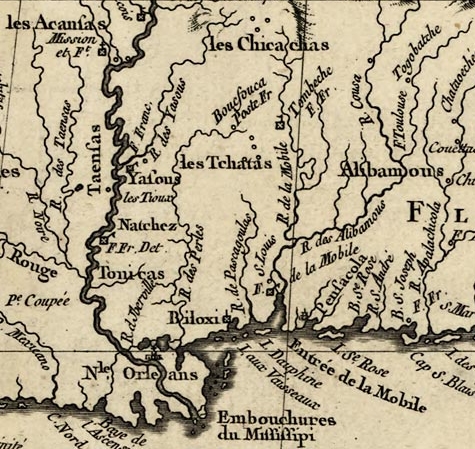Fort Confederation on:
[Wikipedia]
[Google]
[Amazon]
Fort Tombecbe (Fort de Tombecbé), also spelled Tombecbee and Tombeché, was a 
Official Site of Fort Tombecbe Historical Park
National Register of Historic Places in Sumter County, Alabama Tombecbe Tombeche French-American culture in Alabama Tombecbe {{NewFrance-stub
stockade
A stockade is an enclosure of palisades and tall walls, made of logs placed side by side vertically, with the tops sharpened as a defensive wall.
Etymology
''Stockade'' is derived from the French word ''estocade''. The French word was derived f ...
fort located on the Tombigbee River
The Tombigbee River is a tributary of the Mobile River, approximately 200 mi (325 km) long, in the U.S. states of Mississippi and Alabama. Together with the Alabama, it merges to form the short Mobile River before the latter empties i ...
near the border of French Louisiana
The term French Louisiana ( ; ) refers to two distinct regions:
* First, to Louisiana (New France), historic French Louisiana, comprising the massive, middle section of North America claimed by Early Modern France, France during the 17th and 18th ...
, in what is now Sumter County, Alabama
Alabama ( ) is a U.S. state, state in the Southeastern United States, Southeastern and Deep South, Deep Southern regions of the United States. It borders Tennessee to the north, Georgia (U.S. state), Georgia to the east, Florida and the Gu ...
. It was constructed under the leadership of Jean-Baptiste Le Moyne, Sieur de Bienville
Jean-Baptiste Le Moyne de Bienville (; ; February 23, 1680 – March 7, 1767), also known as Sieur de Bienville, was a French-Canadian colonial administrator in New France. Born in Montreal, he was an early governor of Louisiana (New France) ...
in 1736–1737 as trading post about upriver from Mobile, on an limestone bluff. Fort Tombecbe was built in Choctaw
The Choctaw ( ) people are one of the Indigenous peoples of the Southeastern Woodlands of the United States, originally based in what is now Louisiana, Mississippi and Alabama. The Choctaw language is a Western Muskogean language. Today, Choct ...
lands and would play a major role in colonial France's efforts to stop British intrusions into the area. Bienville claimed that the new fort was to protect the Choctaw from the Chickasaw
The Chickasaw ( ) are an Indigenous people of the Southeastern Woodlands, United States. Their traditional territory was in northern Mississippi, northwestern and northern Alabama, western Tennessee and southwestern Kentucky. Their language is ...
. In May of 1736, Bienville, along with a force of 600 soldiers combined with a force of 600 Choctaw warriors, set out from Fort Tombecbe and attacked the Chickasaw near present-day Tupelo, Mississippi
Tupelo ( ) is a city in and the county seat of Lee County, Mississippi, United States. Founded in 1860, the population was 37,923 at the United States Census, 2020, 2020 census. It is the List of municipalities in Mississippi, 7th-most populous ...
at the Battle of Ackia. Tombecbe was a major French outpost and trade depot among the Choctaw, the largest Native American group in the colony.
Control passed to the British in 1763, who renamed it Fort York. In 1793 Spain
Spain, or the Kingdom of Spain, is a country in Southern Europe, Southern and Western Europe with territories in North Africa. Featuring the Punta de Tarifa, southernmost point of continental Europe, it is the largest country in Southern Eur ...
acquired the site—by then the fort had been abandoned—from the Choctaw via the Treaty of Boukfouka and built a new fort, which was named Fort Confederación. It is also known as Fort Confederation. After the United States
The United States of America (USA), also known as the United States (U.S.) or America, is a country primarily located in North America. It is a federal republic of 50 U.S. state, states and a federal capital district, Washington, D.C. The 48 ...
took possession, via the 1802 Treaty of Fort Confederation
The Treaty of Fort Confederation was signed on October 17, 1802, between the Choctaw (an American Indian tribe) and the United States Government. The treaty ceded about of Choctaw land, including the site of Fort Tombecbe, also known as Fort Co ...
, it continued to be used as a trading post with the Choctaws until its eventual abandonment in the 19th century.
The Fort Tombecbe site is currently owned by the University of West Alabama
The University of West Alabama (UWA) is a public university in Livingston, Alabama, United States. Founded in 1835, the school began as a church-supported school for young women called "Livingston Female Academy".
The university serves students ...
and the Archaeological Conservancy, and operated by the staff of the Black Belt Museum.

See also
*Chickasaw Wars
The Chickasaw Wars were fought in the first half of the 18th century between the Chickasaw allied with the British against the French and their allies the Choctaws, Quapaw, and Illinois Confederation. The Province of Louisiana extended from I ...
*History of Alabama
The history of what is now Alabama stems back thousands of years ago when it was inhabited by indigenous peoples. The Woodland period spanned from around 1000 BC to 1000 AD and was marked by the development of the Eastern Agricultural Complex. ...
References
External links
Official Site of Fort Tombecbe Historical Park
National Register of Historic Places in Sumter County, Alabama Tombecbe Tombeche French-American culture in Alabama Tombecbe {{NewFrance-stub